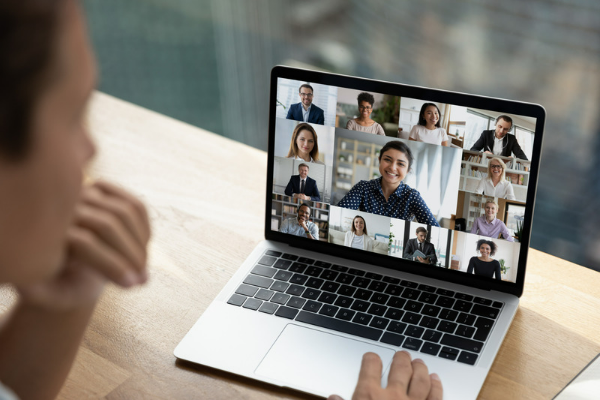 .
.Thanks to the social distancing measures enforced during the pandemic, online meeting platforms such as Zoom skyrocketed to the top of the market. It gave people a contactless way to conduct webinars, business meetings, and even qualitative research.
However, this video conferencing software is not without its drawbacks. In this article, we discuss the pros and cons of using Zoom for focus groups and if it is the best choice for your focus group discussions.
Pros
1. Close Online Alternative
Participants
Zoom’s video conferencing capability provides participants with a more realistic experience than phone-only interviews. Being able to see and converse with the moderator and other group members virtually delivers a fundamentally similar experience to an in-person focus group.
Clients
Client observers can view online sessions in real-time by joining with a different name and turning off their mic. Furthermore, the private chat feature can be used to provide additional instructions to the moderator – allowing them to contribute to the session without disrupting the flow of discussion.
Researchers
Compared to phone interviews, seeing respondents face-to-face onscreen lends itself to creating a natural focus group environment. This helps researchers build rapport easier so that people can share their opinions and bounce ideas off of each other comfortably. Presenting stimuli is also simpler because content can be shown instead of described.
2. Convenience
Participants
Attending an online focus group cuts down on traveling time to the research facility. Moreover, Zoom‘s time-constrained meetings let participants know how much time the discussion will take out of their day. This feature, combined with the ease of access to the meeting room, makes people more agreeable to participate in the study.
Clients
Using Zoom for focus groups saves clients money that could otherwise be used for logistical matters such as food, transportation, accommodations, and facility rentals. Like what was mentioned above, clients can also drop in and observe the focus group discussions without having to travel to attend.
Researchers
One of the biggest advantages of online is that it allows researchers to gather participants globally. It eliminates the need to focus recruitment efforts on a specific geographical area. Thus, saving researchers a lot of time in assembling a sample pool and giving them more space for other activities.
3. User-Friendly
Participants
Zoom’s simple and intuitive user interface makes it easy to grasp for beginners. Once the camera and mic have been set up, you’re only a few clicks away from joining the meeting room and participating in the focus group.
Clients
Even though there’s no dedicated technician to address IT problems immediately, Zoom’s software seems to work fine for users. Issues such as connection problems tend to get solved relatively fast, only causing a few delays in the session.
Researchers
Conducting focus groups using Zoom makes the researcher’s job easier because it requires minimal participant onboarding. Aside from exploratory research, this video conferencing software is also used for various purposes (e.g., business meetings, webinars, and online classes). For this reason, most people are already familiar with how it functions.

Cons
1. Privacy Concerns
Zoom is the go-to option for personal or professional video conferencing mainly because it is user-friendly. Unfortunately, this ease of use could lead to a variety of privacy issues that could compromise the security of participants’ data, such as:
Lack of End-to-End Encryption
According to Zoom’s privacy practices, audio and video recordings generated from each meeting would remain protected from outsiders (e.g., hackers, bots). However, Zoom itself could access unencrypted content from any meeting done on the platform. This means that the service is not fully encrypted.
“Zoombombing”
Zoombombing refers to trolls that crash Zoom calls by uncovering public meeting links. There have been multiple complaints of Zoombombers that have joined public meetings and shared inappropriate content with unsuspecting users inside the online room. Having this happen in a focus group may disrupt the entire session and lead participants to not share their data out of worry that the platform isn’t secure.
Zoom recordings on the open web
Users with a pro account can record, save and store meetings in Zoom and 3rd party cloud services. However, this could be a potential privacy concern because Zoom’s default filenames are named identically. If the host uploads a recording on an unprotected cloud service without changing the filename, anyone on the web can search, download, and watch it.
2. Technical Difficulties
Like most video conferencing software, Zoom isn’t immune to technical difficulties. Internet issues may plague focus groups because users cannot connect or sustain a stable connection. Furthermore, reconnecting and joining the meeting room again may take some time to accomplish.
As a result, some people may miss parts of the conversation, impacting the moderator’s ability to track the discussion and ask effective follow-up questions.
3. Limited Features and Usability
Zoom gives basic users all the essential features needed for online meetings. However, researchers will need more than simple video conferencing capabilities when executing a focus group study. Project coordination, audio masking, video blurring, and dedicated tech support are all considerably valuable features for exploratory research – all of which Zoom doesn’t currently offer.
Should You Be Conducting Focus Groups Using Zoom?
Zoom is a great alternative to face-to-face meetings in general. But if you aim to facilitate a seamless and productive focus group session, utilizing a marketing research service provider that specializes in interviews and focus groups is your best bet.
Working with a business that understands how the qualitative research process works and is dedicated to solving your project issues ensures that you get the data you need for actionable insights.
Conduct Your Focus Groups with the Best Tools in the Market
Civicom® Marketing Research Services is the global leader in providing web-enabled solutions for your market research projects. Our technological toolbox includes services for online interview and focus group facilitation, mobile research, online communities, media curation, plus other solutions that cater to your project needs.


